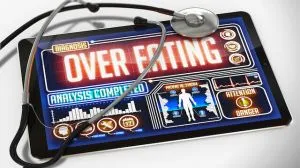
- Share on Facebook18
- Share on Pinterest
- Share on Twitter
Many people vastly underestimate how many calories they consume in a day. Even if you believe you restrict your daily calorie consumption, you may be consuming more calories than you think due to one or more of these sneaky reasons for overeating.
“I exercise all the time but I still can’t lose weight!”
“I eat healthily, but I can’t lose those last 10 pounds!”
“I eat right and exercise, but I’m gaining weight!”
Have you ever made a statement like one of these? If you have, you may have fallen prey to one of the sneaky causes behind overeating. Find out the surprising causes of overeating and how you can address them below:
Eating small, frequent meals
A few years ago, the health world decided that eating more frequent, smaller meals was the way to ultimate health. However, eating numerous meals in a day may cause some people to consume more calories. According to a 2015 study published in Eating Behaviors, women who ate when they did not feel hungry (in this study they were offered a chocolate snack after they were full), were more likely to be overweight or obese. If you choose to eat multiple small meals a day, pay extra attention to your calorie consumption so you do not accidentally eat too much.
Eating for fitness
Have you ever heard the term “carb load”? Many fitness lovers like to snack on something tasty or drink a smoothie pre- or post-workout. However, many “fitness” foods are full of sugar and high-calorie ingredients. Not only are these processed foods unhealthy, few exercisers exert enough energy to counterbalance their high-calorie content.
Make sure you eat natural, unprocessed foods before or after a workout, and check that the calorie content of the food you eat is not higher than the calories you burn during exercise. Even vegetable and fruit smoothies can have a high calorie content and lead to weight gain.
Drinking alcohol
Alcohol has a surprising amount of calories. A 1.5 ounce of liquor contains about 100 calories, one beer contains about 150 calories and a glass of wine contains about 125 calories. In addition to being a large source of calories on its own, drinking alcohol also makes you more likely to eat more. A 2015 study published in Obesity found that when women drank alcohol, they were more likely to consume more calories at mealtimes. The researchers found that consuming alcohol made the women more responsive to food odors, which in turn, caused them to eat more.
Drink alcohol in moderation and make healthy food choices even when drinking.
Hanging out with friends
 Social pressure leads to overeating. Most social situations, such as happy hour, sports games and holidays revolve around food. Social pressure makes it challenging to avoid unconscious overeating.
Social pressure leads to overeating. Most social situations, such as happy hour, sports games and holidays revolve around food. Social pressure makes it challenging to avoid unconscious overeating.
Pay attention to what goes in your mouth when hanging out with friends. Stick to healthier food options (vegetables and fruit are always good choices) when possible, or eat small portions to avoid overeating in social situations.
Mindless eating
Eating engages all the senses, activating pleasure centers of the brain. Eating needs to be pleasurable or we would probably stop eating altogether. However, meals are meant to be savored and require your full attention. When you eat while distracted, you are more likely to consume more food because you are not paying attention to your body’s full signals.
Slow down and pay attention to signals from your body while eating. According to Harvard Health, a normal-sized meal should take about 20 minutes to finish. Stop eating when you first start to feel full.
Big plates and large packages of food
According to a 2006 study published in the Journal of the Federation of American Societies for Experimental Biology, large plates and packages of food cause people to eat more without even realizing it. When something is sold in a “single-serve” package, regardless of how large it actually is, it tricks our brains into thinking we should eat that much even if we get full before we finish the serving. When the researchers tested package size, they found that large plates and large packages of food caused study participants to unconsciously consume 56 percent more.
Eat on small plates and purchase the smallest package size, or only get enough out of a package to fill a small plate.
Avoid these sneaky causes of overeating and weight gain and you will have a much easier time finding and maintaining a healthy weight.
—The Alternative Daily
Sources:
http://news.health.com/2015/07/06/4-sneaky-things-that-can-make-you-overeat
http://www.metabolife.com/content/why-people-overeat
http://www.webmd.com/diet/obesity/8-sneaky-things-that-could-be-making-you-fat
http://www.fasebj.org/cgi/content/meeting_abstract/20/4/A618-c
http://www.health.harvard.edu/blog/distracted-eating-may-add-to-weight-gain-201303296037
http://www.calorieking.com/calories-in-liquor.html
http://www.calorieking.com/calories-in-beer.html
http://www.calorieking.com/calories-in-wine.html
http://onlinelibrary.wiley.com/doi/10.1002/oby.21109/abstract;jsessionid=58162C4E9BE806C3617D07DE7582946B.f03t01
http://www.sciencedirect.com/science/article/pii/S1471015315000677
- Share on Facebook18
- Share on Pinterest
- Share on Twitter

